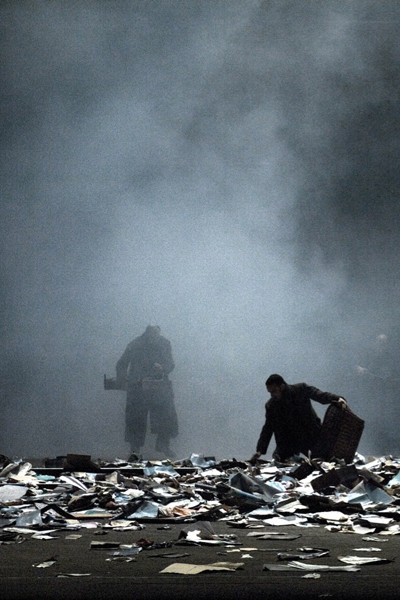
[the trash collectors]
Leoš Janáček, From the House of the Dead
[Z mrtvého domu]
Wednesday, December 2, 2009, 8PM
Production: Patrice Chéreau
Associate Director: Thierry Thieu Niang
Conductor: Esa-Pekka Salonen
Main Cast: Willard White (Alexandr Gorjančikov), Eric Stoklossa (Aljeja)
Stefan Margita (Filka Morozov)
How to make a narrative of so relentless yet monotonous, time-ravaging and exitless an experience as life in this Siberian prison camp? Janàček’s oneiric, episodic opera—a very selective adaptation of Dostoevsky’s memoir-novel Notes from the House of the Dead [Записки из мертвого дома]—does not err that way. What does happen here: a death, an education, an unredemptive recognition, an evanescent collaboration. Only one of the men has a definite future outside. Other prisoners sing songs that refer invariably to their lives before, what landed them in the hope-shorn present. That one of them falls dead during this lean duration, hardly 100 minutes and sans intermission, gives us but an accidental glimpse into the men’s collectively terminal prospects. (And when Filka/Luka dies while Shishkov insistently, obliviously keeps singing, story-song takes on a Scheherazade effect.) Save the sparse chance encounter, enmity or complicity with one another from the outside—we’re never sure just how long ago—they are joined only by their common condition. Save sympathy for and sublimation through a winged animal they tend back to flight, they seem barely related in feeling. These are men who have wronged and are wronged. Dostoevsky’s stand-in, political prisoner Gorjančikov—whose entrance launches the drama but whose own past stays unknown—is the only character who attempts meaningful action within the prison, but his attempt to give young Aljeja a future (by teaching him to read) occurs only at the very margins.
Patrice Chéreau’s set of minimalist but hulking geometries and gunmetal grays in the prison yard, sparse thin-frame beds in the barracks, lends an industrial air to the premises. Over the course of the overture, materializing one by one from darkness, thirty-some prisoners slowly tread onto stage—lifeless, lumbering figures in search of space. We see the joyless swinging of buckets, hear the cold crackling of ankle shackles. One man in a corner lights a cigarette—retrieving something like personal experience thereby—and in the darkness, by default, the spark and smoke mark him as almost individual. A brawl suddenly erupts between two men for no apparent reason, because in this place there’s every reason, and the way their peers immediately converge at that wrestling knot to break it up reveals at once this group’s self-regulation and, such bare and by now habitual restoration of equilibrium apart, disaggregation as its default. In this meticulous opening scene Chéreau shows two other circumstances under which these men will readily self-assemble: the rough but swift lining up for sop ladled from buckets; the game to be had of kicking around a shoe as a ball.
The eagle, about which there’s been much discussion, soon suggests another, more poignant and more promising coming together. Upon discovering this wounded bird fallen into their midst, one prisoner starts running around with a blanket cape and stew-pot helmet in wishful mimicry. But other prisoners try raising the bird into the air. This image of arms raised aloft, the bird the high vertex of their bodies and their longings, was absolutely unforgettable. Having now seen this in person—from the nearness of the tenth row in orchestra—one can judge as moot the controversy surrounding the intended verisimilitude of this bird. Whatever Janàček’s vision, I’m not sure Chéreau intended this moment to constitute an event any more singular than the characters’ cycling through of twice-told tales. Indeed, when eventually freed into flight—to cries of “The eagle is czar!”—the bird is furtively tucked back, wings folded, into the old man’s coat.
My favorite directorial moment in this staging comes during the transition between the First and Second Acts: an avalanche of paper rubbish crashing in from above onto the vacated stage, leaving the entire set smoking with dust and debris like some aftermath of war. Not manna from heaven but an injunction to useless labor, this mess draws the men back to slowly repopulate the stage with clean-up baskets and a heavy work-song. In an affecting use of real time, the stage by the end of the scene has been entirely cleared.
In the libretto, between personal histories and two pantomimes, some solitary lines cut through. “A prisoner owns nothing.” “My dear children—I’ll never see you again.” “You’re my father!” cries Aljeja when bidding his mentor and friend farewell, while Gorjančikov can only reply, “My child! I don’t know if I’ll ever see you again.” But of all the heartbreaking truths surely this is the most tragic: “My eyes will never again see the land where I was born.”
There is much to be written on opera’s treatment of prison life. The pertinent scenes in Fidelio and Don Carlo would be richest next to From the House of the Dead, although in both of those works the inevitable individuations of romantic love get in the way of more radically exploring the possibility of populous camaraderie, while here the possibility proves precarious even when no other relation can suffice to surrogate.
On the issue of the supertitles: shifting placement helped them to melt into the set, and these projections could even have implied a quiet acknowledgment of the drama’s textual origins. I’d love to see the Met incorporate this method into other productions.